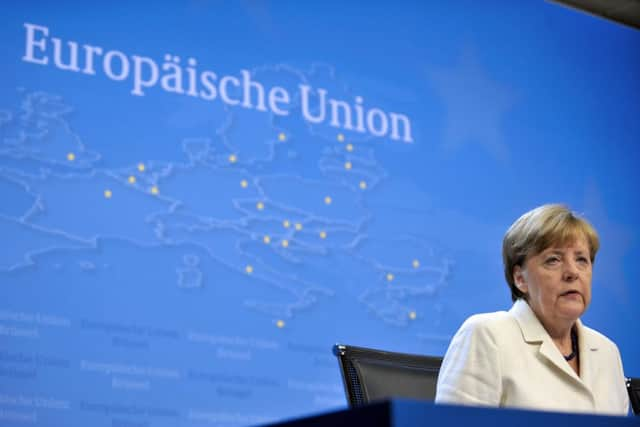Greece ‘humiliated’ as new EU bailout deal reached


Amid one of the worst crises in the EU’s history, the head of the European Commission said the risk of Greece leaving the eurozone had been averted.
But it will mean a fresh wave of austerity for hard-pressed Greeks and comes just a week after a referendum which saw the people reject such measures.
Advertisement
Hide AdAdvertisement
Hide AdThe deal was reached after a marathon 17-hour session of talks in Brussels. Critics say the hardline deal represents an attack on Greek national sovereignty and sours the European dream.


Greece is now poised to accept sweeping sell-offs across the country’s electricity networks, ports and airports. In return, the country will secure short-term “bridging” loans to save it from bankruptcy, with a £61 billion bailout to be secured later this summer over three years.
EU chiefs say they needed cast-iron assurances that the left-wing Syriza government makes the cuts needed to bring its public finances under control as Greece wrestles with debts of £320bn.
The deal will now have to be backed by the Greek parliament on Wednesday and until then the country’s banks will remain closed as they await an extension of credit from the European Central bank (ECB).
The tight timetable is a reflection of how little its creditors trust the Greek government to honour a deal. Greek prime minister Alexis Tsipras infuriated his European partners last month when he called a referendum which saw the people of Greece reject reforms the creditors had proposed.
Mr Tsipras argued that because of concessions, it was a better deal for Greece than the proposals voted down a week ago. “We managed to avoid the most extreme measures,” he said. “Greece will fight to return to growth and to reclaim its lost sovereignty.”
He said he had managed to avoid a demand by some creditors to transfer Greek assets abroad as a form of collateral and to avoid the collapse of the banking sector.
But in Athens today, there was little mood for celebration. “It’s another terrible deal. We are not just depressed, we are angry. I don’t think this deal is going to help us,” one 22-year-old student said.
Advertisement
Hide AdAdvertisement
Hide Ad“This deal is not for the people,” another angry Greek national said. “It’s for the banks and for the rich men who have already taken their money out of the country.”
The hashtag #ThisIsACoup was also trending on Twitter today, not just in Greece but in Germany and internationally.
But some Greeks seemed relieved that the country was not facing financial collapse.
Kostas Lambos, a pensioner, said things would be “difficult in the beginning” but people had to understand the severity of the situation. “This was a necessary step for the country to emerge from the dead ends that had been created in the last few years,” he said.
German chancellor Angela Merkel came under fire over the tough stance she took in negotiations which ruled out the prospect of any write-down of Greek debt.
“Trust needs to be rebuilt,” she said, adding that with the deal, “Greece has a chance to return to the path of growth”.
In a first step towards getting its bailout loans, the Greek government has to pass a set of measures into law by tomorrow.
Measures include an increase in sales tax and reform of the pension system. In later weeks, Greece will have to open to competition industries that have long been protected, such as the energy sector. Labour laws will also be made more flexible.
Advertisement
Hide AdAdvertisement
Hide AdIf it meets these requirements, Greece will get a three-year rescue programme and a commitment to restructure its debt, which is unsustainably high at around 320 billion euro, or 180 per cent of annual GDP.
Greece’s banks, which have been shut for two weeks, were still closed yesterday and 60-euro limits remained on cash withdrawals. Without a deal, they faced the prospect of collapse within days as they are steadily drained of money.
When the banks will be able to reopen will depend on whether the ECB decides to increase emergency credit to Greek banks now that a bailout deal has been clinched in principle. It is unclear whether the ECB will make such a decision on Monday or after Greece passes its first batch of reforms.
But this all depends on legislators passing measures which the governing Syriza party had previously refused to implement, including VAT rises and cutting pensions.
Many of the measures agreed were among those rejected by the Greek people just over a week ago and at least 32 MPs have indicated they are unwilling to support the implementation of these new laws.
French president Francois Hollande said the Greek parliament would convene within hours to adopt the reforms called for in the plan and he celebrated Greece’s continued membership in the euro.
Losing Greece, he said, would have been akin to losing “the heart of our civilisation”.
Other European officials were less emotive. “The Greeks have to show they’re credible, show that they mean it,” said Jeroen Dijsselbloem, president of the eurogroup of finance ministers.
The deal
Advertisement
Hide AdAdvertisement
Hide AdGreece will now be forced to impose VAT hikes, including on restaurants, while popular holiday destinations in the Greek islands will no longer benefit from a lower VAT rate. Corporation tax will also go up, to 28 per cent. Measures will also have to be taken to cut pensions with the retirement age rising to 67 by 2022.
There will also be automatic spending cuts imposed if Greece misses targets to get back into surplus.
Perhaps the most controversial measure has been the move to “sell off” major public assets, including the electricity networks, ports and airports. The money for those sales will go into a separate offshore fund which won’t be under the control of Greece. The first €25 billion from this will be ploughed into recapitalising Greece’s stricken banks, the rest being ploughed into repaying the country’s debts. If agreed, it will secure short- term bridging loans and open the door to €82-86bn of EU bailoutloans over three years.